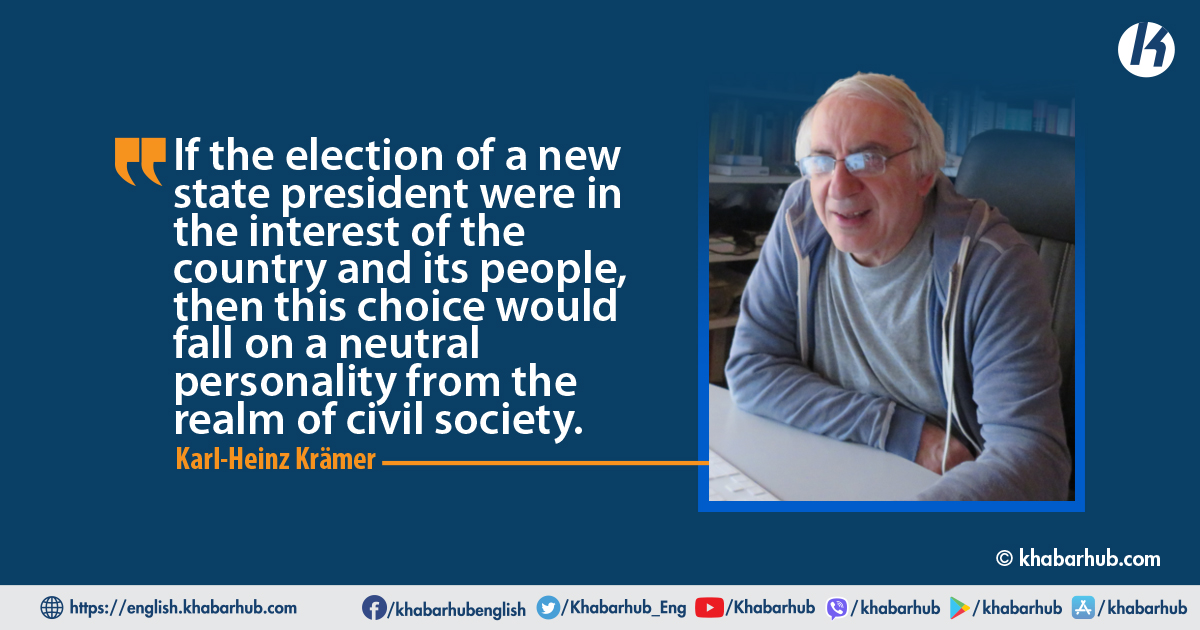In Nepal, they celebrate Democracy Day for three days, whatever there is to celebrate. 72 years ago, the then King Tribhuvan returned to Nepal from exile in India and promised the people democracy, which is still celebrated today.
In reality, of course, it was all stink and lies, as we all know. In the years that followed, the monarchy did everything it could to regain and secure its absolutist power, which ultimately ended in the almost 30-year-long party-less Panchayat system.
The last king, Gyanendra, who was deposed in 2008, has just once again proposed cooperation between the monarchy and political parties, for the “preservation of democracy”, as he explained.
The question remains why an institution that has been rightly abolished is allowed to speak at all; this only exacerbates the crisis.
What is celebrated today as democracy is in reality an oligarchy of a few ageing politicians, all of whom have failed repeatedly, but who still consider themselves irreplaceable.
Twice since 1951 it looked like democracy would prevail: in 1990 after the first people’s movement (Jana Andolan I) and in 2006 after Jana Andolan II and the ending of Gyanendra’s coup.
Nepal has already experienced something similar after the 2017 elections, when the Bibeksheel Sajha Party managed positive approaches of an alternative political force before its leader Rabindra Mishra then outed himself as a monarchist, who is now a member of the RPP.
The new constitution of 2015 was the work of the top politicians of the major parties and brought no real democratic advantage for the people; it served primarily to secure the power of the aforementioned party elites.
Celebrating Prithvi Jayanti
In recent weeks, symbols and ideals of Nepali history that had long been hoped to be overcome have been repeatedly celebrated.
On 11 January, for example, the birthday of Prithvi Narayan Shah, the founder of modern Nepal, was officially celebrated for the first time in years.
This may have been a gesture towards the increasingly vocal supporters of a return to monarchy and the Hindu state.
After all, the party that had taken up this unconstitutional cause had to be integrated into the allegedly Maoist-communist government for reasons of securing power.
The Rastriya Prajatantra Party (RPP) was founded in 1990 as a rallying point for the top politicians of the party-less royal Panchyat system, has split and mergeDecemberd again and again, and is bobbing along in elections in low single-digit percentages. So much only for the significance of this party.
Prithvi Narayan deserves credit for unifying the country to a certain political greatness with his brutal campaigns of conquest.
Otherwise, Nepal would probably not exist today. However, he did not do this out of great political foresight, as is repeatedly claimed, but simply for reasons of personal power and economic advantage.
But this nation-wide seizure of power by the Shah dynasty of Gorkha also had very serious disadvantages for the people in the conquered areas, which are generally kept quiet: Destruction of traditional local land tenure rights, granting of ethnic land to supporters of the monarchy, suppression of ethnic and regional cultures and languages, integration of these groups at a lower level into the Hindu caste system, to name but a few.
This laid the foundations for the unitary state later sought by King Mahendra and his son Birendra: one language, one religion, one culture, one ethnicity, all united by the glorious bond of attachment of the “subjects” to the Shah monarchy.
Anniversary of the Maoist Uprising
The next big celebration this year was the anniversary of the Maoist uprising on 13 February. Prime Minister PK Dahal has now declared it a National Holiday for the first time because of the glorious achievements of the uprising.
The uprising, which was marked by heavy losses and serious crimes and human rights violations by both Maoists and state security forces, has brought few significant changes, some of which are increasingly being challenged: Secularism, federalism, republic. The social inclusion promised by all political parties in 2006 is more distant than ever.
Thousands of victims of the uprising continue to wait in vain for justice. Only a few perpetrators from the time of the uprising have been convicted so far.
It is significant that one of those perpetrators has now been pardoned as part of the usual action on the occasion of Democracy Day.
Celebrating democracy
And so now, three-day celebrations of democracy, that is, the rule of the people. These people have recently expressed in elections what they want and what they do not want.
For example, they have made it clear that they no longer want this old failed guard of male Khas Arya politicians, including those of the previous ruling alliance, who had tried to maintain their power through extreme anti-democratic manipulation of the electoral system, or those who in 2020/21 had accepted the destruction of Nepal’s parliamentary system in order to maintain their personal power.
Only the PR system allows a statement on the status of the political parties and here the losses of the three big parties were clear: Nepali Congress -7%, CPN (UML) -6.3%, CPN (MC) -2.5%. At the same time, parties that offered themselves as alternatives experienced a huge boost.
Oli and Dahal have agreed that the post of prime minister should switch to Oli after two and a half years, however, this is to be handled legally, but constitutional rules do not interest Nepal’s failed top politician anyway.
Unfortunately, after the elections, some of these alternative forces turned out to be renewed kingmakers to keep the failed old politicians in power, instead of finally forcing them to make a generational change.
Nepal has already experienced something similar after the 2017 elections, when the Bibeksheel Sajha Party managed positive approaches of an alternative political force before its leader Rabindra Mishra then outed himself as a monarchist, who is now a member of the RPP.
Positive approaches like those of the Rastriya Swatantra Party (RSP) obviously lose their impact as soon as the traditional power merry-go-round of the ruling oligarchy takes effect.
Thus, Nepal now has a prime minister whose party received just 11 per cent of the vote and which won at least some of the direct mandates only thanks to the manipulative electoral alliance of the then ruling parties.
So, Dahal is prime minister thanks to the direct votes of, for example, traditional NC voters, but this has forced it into opposition, which this party, in turn, does not see that way. Democracy in Nepal supposedly does not need an opposition.
At the same time, the strings in the background of the current government are pulled by KP Oli, who two years ago led Nepal’s political system to the brink of ruin. It took his removal by the Supreme Court to stop him and his state president who was loyal to him.
And Oli would not be Oli if he did not focus everything on his quick return to power. A year and a half ago, Dahal had played a decisive role in Oli’s downfall, allegedly because he no longer considered him tenable.
Now, however, the post of prime minister was more important to Dahal than his blather of yesterday. But Dahal was to pay dearly for his post.
Oli insisted on about a third of the ministerial posts for his party. In addition, he wanted all important new state posts to be reserved for the UML.
If the election of a new state president were in the interest of the country and its people, then this choice would fall on a neutral personality from the realm of civil society.
At some point, Dahal must have realised that he was only a puppet in Oli’s power game. Since Dahal knows better than anyone else how to fly his flag with the wind and to throw away yesterday’s promises, the signs within the governing coalition are now pointing to a storm.
Oli and Dahal have agreed that the post of prime minister should switch to Oli after two and a half years, however, this is to be handled legally, but constitutional rules do not interest Nepal’s failed top politician anyway.
Of utmost importance for Oli is that he then has a state president at his side who will rubber-stamp his every potential executive decision unchecked, as Bidya Devi Bhandari has willingly done repeatedly.
So Oli still needs this post of state president for his party to have the state machinery more or less under his control.
Within no time, Oli would then be back where he was dishonourably dismissed in 2021. Why the latter did not have further political consequences for him remains incomprehensible anyway.
If the election of a new state president were in the interest of the country and its people, then this choice would fall on a neutral personality from the realm of civil society.
But as it is, it is once again an important element in the power game of the failed political elites and parties. Nepal remains an oligarchy and not a democracy. So let’s celebrate National Oligarchy Day!
(The views expressed in this article are those of the author’s and do not necessarily reflect the policy or position of Khabarhub)









Comment